Invited Speakers (In the presentation order)
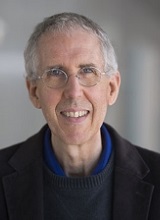 |
Alfred Hero |
Alfred Hero is John H. Holland Distinguished University Professor of
Electrical Engineering and Computer Science and the R. Jamison and Betty
Williams Professor of Engineering at the University of Michigan, Ann Arbor.
He is also founding Co-Director of the University’s Michigan Institute for
Data Science (MIDAS). He has appointments, by courtesy, in the Department of
Biomedical Engineering and the Department of Statistics. He received his Ph.D
in Electrical Engineering and Computer Science from Princeton University. He
is Fellow of the Institute of Electrical and Electronics Engineers, was President
of the IEEE Signal Processing Society, and has served on the IEEE Board of Directors
of the IEEE. He is chair of the Committee on Applied and Theoretical Statistics under
the US National Academies and co-chair of the SAMSI National Advisory Committee. Alfred
Hero’s recent research interests are in high dimensional spatio-temporal data, multi-modal
data integration, statistical learning and signal processing.
 |
Tie-Yan Liu |
Tie-Yan Liu is an assistant managing director of Microsoft Research Asia, a fellow of the IEEE, and a
distinguished scientist of the ACM. He is also an adjunct/honorary professor at Carnegie Mellon University (CMU),
University of Nottingham, and Tsinghua University. He is well known for his pioneer work on learning to rank, and
recently he has done impactful research on deep learning, reinforcement learning, and distributed learning. He
published 200+ papers in top conferences and journals, with tens of thousands of citations. He has been invited to
serve as general chair, PC chair, local chair, or area chair for a dozen of top conferences including WWW/WebConf,
SIGIR, KDD, ICML, NIPS, IJCAI, AAAI, ACL, ICTIR, as well as associate editor of ACM Transactions on Information Systems,
ACM Transactions on the Web, and Neurocomputing. He won the best (student) paper award at SIGIR (2008) and ACML (2018),
the most cited paper award at Journal of Visual Communications and Image Representation (2004-2006), the most cited Chinese
researcher award by Elsevier (2017, 2018), China AI Leader Award – Technical Innovation (2018), and Most Influential Scholar
Award by AMiner (2007-2017). His team released LightGBM in 2017, which has become one of the most popular machine learning tools
in Kaggle and KDD Cup; his team helped Microsoft achieve human parity in machine translation in 2018 and won 8 champions in the WMT
machine translation competition in 2019; his team also built the world-best Mahjong AI, named Suphx, which achieved 10 DAN on the Tenhou
Mahjong platform in mid 2019.
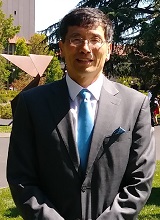 |
Zhi Ding |
Zhi Ding is a Professor of Electrical and Computer Engineering at the University of California, Davis. He received his Ph.D. degree in Electrical Engineering from Cornell University in 1990. From 1990 to 2000, he was a faculty member of Auburn University and later, University of Iowa. Prof. Ding has held visiting positions in Australian National University, Hong Kong University of Science and Technology, NASA Lewis Research Center and USAF Wright Laboratory. His major research interests lie in the general field of signal processing and communications. Prof. Ding has active collaboration with researchers from many universities including those in Australia, China, Finland, Japan, Canada, Taiwan, Korea, and Singapore. He has coauthored over 300 technical papers and two books. Dr. Ding is a coauthor of the text: Modern Digital and Analog Communication Systems, 4th edition and 5th edition, Oxford University Press.
Dr. Ding is a Fellow of IEEE and has been an active member of IEEE, serving on technical programs of several workshops and conferences. He served both as a Member and also the Chair of the IEEE Transactions on Wireless Communications Steering Committee from 2007-2001. Dr. Ding was the Technical Program Chair of the 2006 IEEE Globecom and the General Chair of the 2016 IEEE International Conference on Acoustics, Speech and Signal Processing (ICASSP). He served as an IEEE Distinguished Lecturer (Circuits and Systems Society, 2004-06, Communications Society, 2008-09). He received the 2012 Wireless Communications Recognition Award from the IEEE Communications Society. He currently also serves as the Chief Information Officer of the IEEE Communications Society.
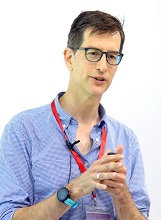 |
Stark Draper |
Stark Draper is a Professor of ECE at the University of Toronto (UofT). His received his undergraduate degrees (BS in EE and BA in history) from Stanford University and his MS and PhD degrees in EECS from MIT. He completed postdoctoral fellowships at the University of Toronto and University of California, Berkeley. He then worked at the Mitsubishi Electric Research Labs (MERL). Before returning to Torono he was an assistant and associate professor at the University of Wisconsin, Madison. Professor Draper’s research interests include information and coding theory, optimization and security, and the application of these disciplines to problems in communications, computing, and learning. Recent industrial collaborations include with Huawei, AMD, Disney Research, and MERL. He chairs the new “Machine Intelligence” major at UofT and serves on the IEEE Information Theory Society Board of Governors. He is spending the 2019-20 academic year on sabbatical visiting the Chinese University of Hong Kong, Shenzhen.
 |
Hongyu Zhao |
Hongyu Zhao is the Ira V. Hiscock Professor and Chair of Biostatistics at Yale University. He is an expert in statistical genetics, genetic epidemiology, and computational biology. Dr. Zhao is a Co-Editor of the Journal of the American Statistical Association – Theory and Methods, and was the recipient of several honors, including the Mortimer Spiegelman Award for a top statistician in health statistics by the American Public Health Association, and Pao-Lu Hsu Prize by the International Chinese Statistical Association. His current research interests are the developments and applications of statistical methods in molecular biology, genetics, drug developments, and precision medicine.
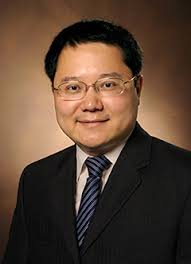 |
Hua Xu |
Hua Xu is a Professor at the School of Biomedical Informatics in The University of Texas Health Science Center at Houston (UTHealth), as well as an elected fellow of the American College of Medical Informatics. He directs the Center for Computational Biomedicine at UTHealth. Dr. Xu received his Ph.D. in Biomedical Informatics from Columbia University. His primary research interests include biomedical natural language processing (NLP) and data mining, as well as their applications in secondary use of electronic health records data for clinical and translational research. His research is funded by multiple agencies (i.e., NLM, NCI, NIGMS, AHA, and CPRIT), and methods/tools developed in his lab have been top ranked in biomedical NLP shared tasks and widely used to support diverse biomedical applications. He served as the Chair of American Medial Informatics Association (AMIA) NLP Working Group and now leads the Observational Health Data Sciences and Informatics (OHDSI) NLP Working Group.
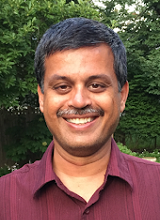 |
R. Srikant |
R. Srikant is currently the Fredric G. and Elizabeth H. Nearing Endowed Professor with the Department of Electrical and
Computer Engineering, and a Professor with the Coordinated Science Lab, University of Illinois at Urbana-Champaign. His research interests include communication networks, machine learning, and
applied probability. He has received a number of awards, including the 2015 IEEE INFOCOM Achievement Award, the 2015 IEEE INFOCOM Best Paper Award, the 2017 Applied Probability Society Best Publication Award, and the 2019 IEEE Koji Kobayashi Computers and Communications Award. He was the Editor-in-Chief of the IEEE/ACM
TRANSACTIONS ON NETWORKING from 2013 to 2017.
 |
Zhengyou Zhang |
Zhengyou Zhang received the B.S. degree in electronic engineering from Zhejiang University, Hangzhou, China, in 1985, the M.S. degree in computer science from the University of Nancy, Nancy, France, in 1987, and the Ph.D. degree in computer science in 1990 and the Doctorate of Science (Habilitation à diriger des recherches) in 1994 from the University of Paris XI, Paris, France.
Dr. Zhang is an ACM Fellow and an IEEE Fellow. He is the Founding Editor-in-Chief of the IEEE Transactions on Cognitive and Developmental Systems, is on the Honorary Board of the International Journal of Computer Vision and on the Steering Committee of the Machine Vision and Applications, and has served as an Associate Editor for many journals. He was a General Co-Chair of IEEE Conference on Computer Vision and Pattern Recognition (CVPR) 2017. He received the IEEE Helmholtz Test of Time Award at ICCV 2013 for his paper published in 1999 on camera calibration, now known as Zhang's method.
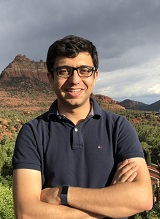 |
Meisam Razaviyayn |
Meisam Razaviyayn is an assistant professor of Industrial and Systems Engineering and
Computer Science at the University of Southern California. Prior to joining USC, he was a
postdoctoral research fellow in the Department of Electrical Engineering at Stanford University.
He received his PhD in Electrical Engineering with minor in Computer Science at the University of
Minnesota under the supervision of Professor Tom Luo. He obtained his MS degree in Mathematics under
the supervision of Professor Gennady Lyubeznik. Meisam Razaviyayn is the recipient of IEEE Data Science
Workshop Best Paper Award in 2019, the Signal Processing Society Young Author Best Paper Award in 2014,
and the finalist for Best Paper Prize for Young Researcher in Continuous Optimization in 2013 and 2016.
His research interests include the design and analysis of large scale optimization algorithms arise in
modern data science era.
 |
Ami Wiesel |
Ami Wiesel received the B.Sc. and M.Sc. degrees in electrical engineering from Tel-Aviv
University, Tel-Aviv, Israel, in 2000 and 2002, respectively, and the Ph.D. degree in electrical
engineering from the Technion - Israel Institute of Technology, Haifa, Israel, in 2007.
He was a postdoctoral fellow with the Department of Electrical Engineering and Computer Science,
University of Michigan, Ann Arbor, USA, during 2007–2009. He is currently an Associate Professor
in the Rachel and Selim Benin School of Computer Science and Engineering, Hebrew University of
Jerusalem, Israel. Since 2018, he is also a Visiting Researcher in Google.
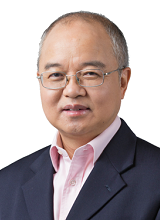 |
Yang Wang |
Yang Wang joined the Hong Kong University of Science and Technology (HKUST) in August 2014 as the
Head of the Department of Mathematics. He becomes the Dean of the School of Science in November 2016. Prof Wang has gained broad recognition for his strong vision and outstanding leadership skill in
HKUST. As the head of Mathematics he is widely credited for instilling a strong Can-Do spirit in
the department, for bringing in a strong sense of community and vibrance to the department through
a series of sensible changes, and for having quickly recruited some of the best research talents
into the department. His unique leadership skill is manifested in his tireless pursuit of reachable
goals, his exceptional ability to communicate and inspire, and his relentless belief in the “Small is
Beautiful” philosophy that empowers people. Under his leadership the department has shown a deep commitment
to research, teaching and serving the university. Jointly with CSE it has created the Big Data Technology
MSc program, which is the first of its kind in Hong Kong and is in extremely high demand even in its first
year. Recognizing the need for recruiting talents into mathematics, the department has created the S. S.
Chern Class for talented students. The department has also completed the novel Project Renaissance, which
has turned the public spaces of the department into a gallery of mathematical history and art, and it has
garnered visibility internationally in the mathematics community.
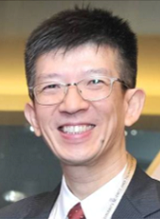 |
Haizhou Li |
Haizhou Li is a Professor at the Department of Electrical and Computer Engineering, National University of Singapore, and a Bremen Excellence Chair Professor at the University of Bremen, Germany. His research interests include speech information processing, natural language processing, and neuromorphic computing. Professor Li has served as the Editor-in-Chief of IEEE/ACM Transactions on Audio, Speech and Language Processing (2015-2018), the President of the International Speech Communication Association (ISCA, 2015-2017), and the President of Asia Pacific Signal and Information Processing Association (APSIPA, 2015-2016). He is a Fellow of the IEEE and the ISCA.
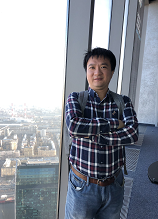 |
Dong Zhang |
Dong Zhang is currently a principle engineer in GTS-Huawei. He received his Ph.D. degree from University of Hong Kong. His primary research interests include transportation/telecom network optimization and planning, scheduling and heuristic algorithm. After graduation, he was research fellow with National University of Singapore and Nanyang Technological University, respectively. Prior to joining Huawei, he took position as optimization expert in Alibaba Damo Academy and SF-Tech.
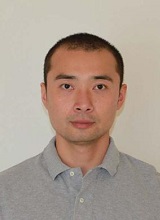 |
Bo Chen |
Bo Chen received the B.S., M.S., and Ph.D. degrees from Xidian University, Xi’an, China, in 2003, 2006, and 2008, respectively, all in electronic engineering. Before joining the National Lab of Radar Signal Processing at Xidian University as a professor, he was a research scientist at the Department of Electrical and Computer Engineering, Duke University from 2008 to 2013. He received the Honorable Mention for 2010 National Excellent Doctoral Dissertation Award and is selected into the Program for New Century Excellent Talents in University and Plan of Overseas Chinese High-levelled Young Talents. As a first/corresponding author, he has published papers in the top journals, such as IEEE TSP, IEEE TPAMI, JMLR and the top conferences, such as NIPS, ICML, ICLR and so on. He is an associate editor for IEEE Transactions on Signal Processing. His current research interests include statistical machine learning, statistical signal processing and radar automatic target detection and recognition.
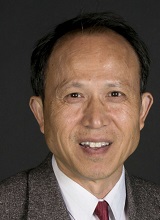 |
Jiangzhou Wang |
Jiangzhou Wang is currently a Professor and the former Head of the School
of Engineering and Digital Arts at the University of Kent, U.K. He has published
over 300 papers in international journals and conferences and four books in the areas
of wireless mobile communications. Professor Wang is a Fellow of the Royal Academy of Engineering, U.K., and a Fellow of the IEEE.
He received the Best Paper Award from the IEEE GLOBECOM2012. He was an IEEE Distinguished Lecturer
from 2013 to 2014. He was the Technical Program Chair of the 2019 IEEE International Conference on
Communications (ICC2019), Shanghai, the Executive Chair of the IEEE ICC2015, London, and the Technical
Program Chair of the IEEE WCNC2013. He has served as an Editor for a number of international journals,
including IEEE Transactions on Communications from 1998 to 2013.
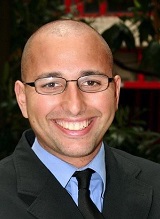 |
Mérouane DEBBAH |
Mérouane DEBBAH received the M.Sc. and Ph.D. degrees from the Ecole Normale Supérieure Paris-Saclay,
France. He was with Motorola Labs, Saclay, France, from 1999 to 2002, and also with the Vienna Research Center
for Telecommunications, Vienna, Austria, until 2003. From 2003 to 2007, he was an Assistant Professor with the
Mobile Communications Department, Institut Eurecom, Sophia Antipolis, France. From 2007 to 2014, he was the
Director of the Alcatel-Lucent Chair on Flexible Radio. Since 2007, he has been a Full Professor with CentraleSupelec,
Gif-sur-Yvette, France. Since 2014, he has been a Vice-President of the Huawei France Research Center and the Director
of the Mathematical and Algorithmic Sciences Lab. He has managed 8 EU projects and more than 24 national and international
projects. His research interests lie in fundamental mathematics, algorithms, statistics, information, and communication
sciences research. He is an IEEE Fellow, a WWRF Fellow, and a Membre émérite SEE. He was a recipient of the ERC Grant
MORE (Advanced Mathematical Tools for Complex Network Engineering) from 2012 to 2017. He was a recipient of the Mario
Boella Award in 2005, the IEEE Glavieux Prize Award in 2011, and the Qualcomm Innovation Prize Award in 2012. He
received 20 best paper awards, among which the 2007 IEEE GLOBECOM Best Paper Award, the Wi-Opt 2009 Best Paper Award,
the 2010 Newcom Best Paper Award, the WUN CogCom Best Paper 2012 and 2013 Award, the 2014 WCNC Best Paper Award,
the 2015 ICC Best Paper Award, the 2015 IEEE Communications Society Leonard G. Abraham Prize, the 2015 IEEE
Communications Society Fred W. Ellersick Prize, the 2016 IEEE Communications Society Best Tutorial Paper Award,
the 2016 European Wireless Best Paper Award, the 2017 Eurasip Best Paper Award, the 2018 IEEE Marconi Prize Paper Award,
the 2019 IEEE Communications Society Young Author Best Paper Award and the Valuetools 2007, Valuetools 2008, CrownCom 2009,
Valuetools 2012, SAM 2014, and 2017 IEEE Sweden VT-COM-IT Joint Chapter best student paper awards. He is
an Associate Editor-in-Chief of the journal Random Matrix: Theory and Applications. He was an Associate Area
Editor and Senior Area Editor of the IEEE TRANSACTIONS ON SIGNAL PROCESSING from 2011 to 2013 and from 2013 to
2014, respectively.
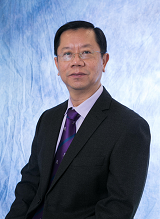 |
Pheng Ann Heng |
Pheng Ann Heng is a professor at the Department of Computer Science and Engineering at The Chinese University of Hong Kong (CUHK).
He has served as the Director of Virtual Reality, Visualization and Imaging Research Center at CUHK since 1999. He has also served as the Department Chairman and Head of Graduate Division before. His research interests include AI and VR for medical applications, surgical simulation, visualization, graphics and human-computer interaction. He is the author of over 450 journal and conference publications in these areas with over 12,000 Google Scholar citations and h-index of 59. His group has received three best paper awards in medical image analysis in recent years, including MIA-MICCAI 2017 best paper award.
He has served as the Director of Center for Human-Computer Interaction at Shenzhen Institutes of Advanced Technology, Chinese Academy of Sciences since 2006 and has been appointed by China Ministry of Education as a Cheung Kong Scholar Chair Professor in 2007.
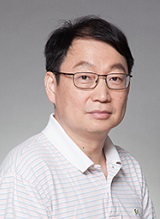 |
Hongyuan Zha |
Hongyuan Zha is a Professor at Institute for Data and Decision Analytics, The Chinese University of Hong Kong, Shenzhen and the School of Computational Science and Engineering, College of Computing, Georgia Institute of Technology. He earned his PhD degree in scientific computing from Stanford University in 1993. Since then he has been working on numerical algorithms, Web search and machine learning. His current research interests include point processes and generative models.